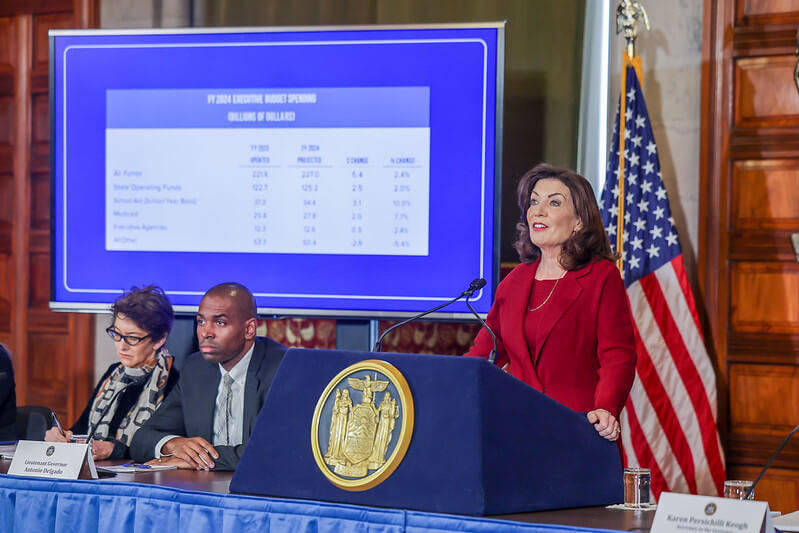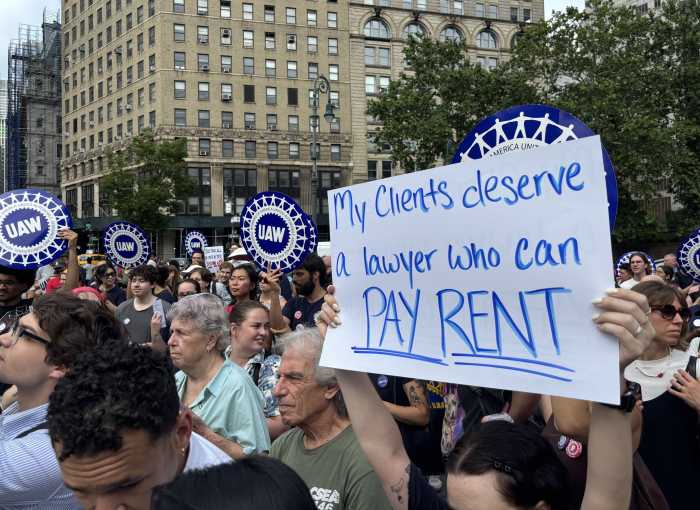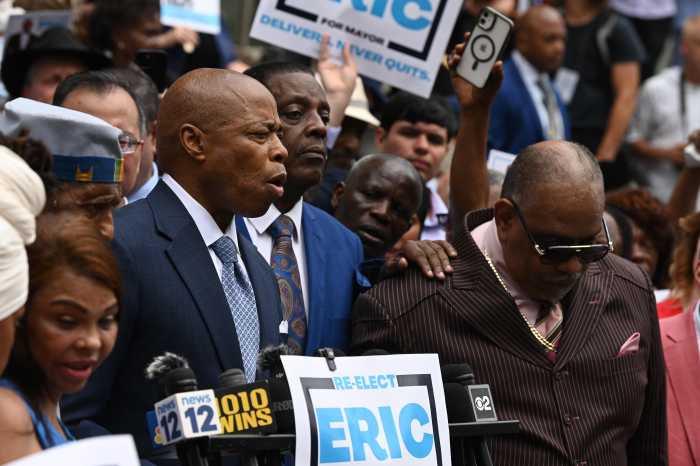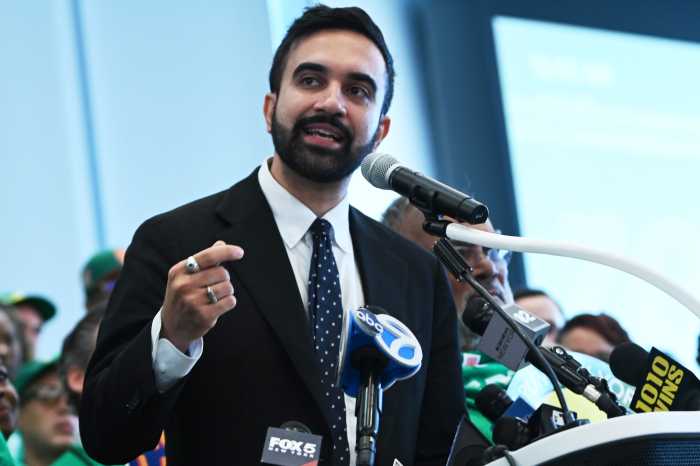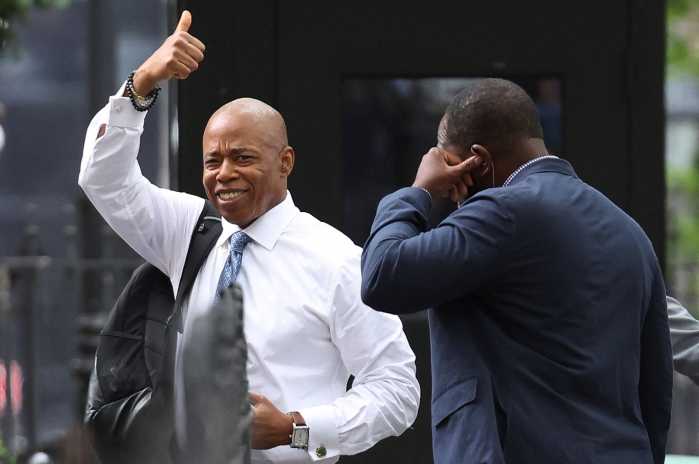Governor Kathy Hochul kicked off the next two months of budget negotiations with the state legislature on Wednesday with the release of her $227 billion Fiscal Year 2024 executive budget proposal.
The governor’s balanced executive budget for the coming fiscal year is up about $7 billion from the current year’s $220 billion adopted budget and up $5.4 billion from the November adjusted budget.
Now Hochul and Albany lawmakers will spend the next eight weeks haggling over her proposed spending plan, a process that must wrap by April 1.
While presenting her budget in the state Capitol Wednesday afternoon, Hochul provided more details about her proposals to address issues like a weakened economy, high crime and a lack of housing production, which she introduced in her annual State of the State address last month.
In that speech, Hochul laid out a vision for the New York version of the American Dream: the New York Dream. But, that’s a dream that still remains out of reach for many, she said — a problem her budget aims to address.
“Today we’re here to talk about how we can help more New Yorkers realize their dreams. So our agenda focuses on affordability, livability, safety, and includes groundbreaking proposals dealing with housing, mental health, child care, public safety, and even a minimum wage increase during these difficult times,” Hochul said. “All [of] this just to make it a little bit easier to be a family living here in New York.”
The plan contains a projected $22 billion in out-year budget gaps over the next three years, which breaks down into $5.7 billion in FY 2025, $9 billion in FY 2026 and $7.5 billion in FY 2027 — according to a budget document from Hochul’s office. The projected gaps can be attributed to an anticipated decline in state tax receipts in the coming years, the document said.
However, due to higher than expected tax receipts for the current fiscal year — to the tune of an additional $5.9 billion — the state will enter the next fiscal year with an estimated $8.7 billion surplus.
Jobs and Taxes
That extra money in the state’s coffers, Hochul said, is a key reason why she won’t be raising income taxes — a pledge she made during her State of the State.
In another bid to help cash-strapped New Yorkers, Hochul reiterated her plan to tie increases in the minimum wage to the rise in inflation.
“No one could have foreseen the effects of inflation, it kind of created a sense of anxiety and insecurity,” Hochul said. “That’s why I announced a plan to peg the minimum wage to inflation, to give you the purchasing power that you lost because of forces outside your control. So, if prices go up, so will wages.”
Due to the large number of jobs lost in New York during the coronavirus pandemic, Hochul’s budget put forward proposals aimed at attracting more companies to set up shop in the Empire State. In part, that means building upon her administration’s deal with the semiconductor manufacturer Micron Technology Inc. to construct a $100 billion plant in central New York, which will create an estimated 50,000 jobs.
The governor plans to broaden that effort by launching the Governor’s Office of Semiconductor Expansion, Management, and Integration (GO-SEMI), which will work to grow the state’s semiconductor industry.
Additionally, Hochul put forth plans to expand workforce development programs, direct state agencies and state funded programs to buy their food from New York farmers and fund economic development initiatives to the tune of $1.3 billion.
But the Invest in Our NY coalition, which is fighting for raising taxes on the ultra-wealthy and corporations to boost funding for the state’s social safety net, criticized Hochul’s spending plan for only extending a 2021 increase in the state’s corporate tax rate through 2026, instead of making it permanent.
“To no one’s surprise, Governor Hochul’s budget proposal presentation continues to prioritize corporate giveaways while failing to sufficiently invest in the services and programs that keep all New Yorkers safe and thriving,” Carolyn Martinez-Class, Invest in Our NY campaign manager, said in a statement.
“We must build on our 2021 corporate tax reform by making the corporate tax permanent and increasing rates on the most profitable corporations so that they pay what they owe New York,” she added.
Gun violence and bail
When it comes to public safety, Hochul said her budget is putting $337 million toward combating gun violence across the state.
That includes $18 million for the Gun Involved Violence Elimination (GIVE) initiative, which will bolster 20 police departments across counties experiencing the bulk of gun violence in the state. And $1 million in addition state funding to help open a Crime Analysis Center in New York City.
In an effort to clear backlogs that built up in the state court system during the coronavirus pandemic, the governor is investing $40 million in additional funding for hiring hundreds of new prosecutors and assisting district attorneys with the increased time it takes to comply with the state’s reformed discovery laws.
Hochul once again called for tweaking the state’s bail laws to roll back parts of reforms made in 2019 that eliminated cash bail for most misdemeanors and nonviolent felonies. The main change she’s seeking is to remove the “least restrictive standard,” which requires judges to consider the least restrictive means for getting a defendant to appear for their court date.
Hochul has maintained that the least restrictive standard leads to confusion among judges as to which crimes are and aren’t bail eligible.
“I’m looking forward to a thoughtful conversation with the legislature about our bail laws,” the governor said. “I reaffirmed my belief in the necessity of making changes and will not turn our backs on the progress that was made. But conflicting language in the law leads to confusion and a lack of accountability for the judges to make their determinations.”
However, public defender group The Legal Aid Society strongly pushed back on Hochul’s proposal to nix the least restrictive standard and said the move may violate the U.S. Constitution.
“The Governor’s call to remove a well-established provision of law requiring that judges consider the ‘least restrictive’ alternative in bail-eligible cases will only lead to the caging of more New Yorkers of color at Rikers Island, a facility imperiled by a range of crises,” the group said in a statement. “We also question the constitutionality of this proposal, as it likely violates United States Supreme Court precedent protecting the presumption of innocence.”
State legislative leaders like Assembly Speaker Carl Heastie have shown little appetite to change the bail laws. While speaking to reporters after Hochul’s budget presentation, Heastie again said he doesn’t believe bail reform has driven the rise in crime across the country, but acknowledged that there’s still a perception of high crime among New Yorkers that can’t be ignored.
“As I’ve said all along, I’m not one that believes that bail has been a driver of crime,” Heastie said. “But I’m very cognizant of the fact that people still feel a perception of crime even though New York City remains one of the safest big cities and New York State remains one of the safest big states. But people’s perception is their reality.”
Heastie’s state Senate counterpart, Majority Leader Andrea Stewart-Cousins, has also shown reluctance to make further changes to bail reform.
Building housing
Hochul also reaffirmed her plan to construct 800,000 new housing units over the next 10 years through her so-called “New York Housing Compact.” The plan would require municipalities downstate to build new housing at a 3% rate, and upstate at 1% rate, every three years.
The administration will help localities meet those targets, Hochul said, with a $250 million “Infrastructure Support Fund” and “$20 million Planning Assistance Fund.” Plus, there’ll be a requirement for any municipality with a train station operated by the MTA to rezone for higher-density development within a half-mile of the station.
But Housing Justice for All, an advocacy group for tenants and homeless individuals, sharply criticized Hochul’s housing plan for benefiting private developers, while not helping most people in need of housing.
“Governor Hochul’s plan prioritizes deregulation and luxury housing production. It is for real estate moguls, not working families,” the group said, in a statement. “Under the guise of ‘affordability,’ the New York Housing Compact will exacerbate gentrification and inequality across New York State while doing nothing to keep New Yorkers housed or help them afford the rent today.”



